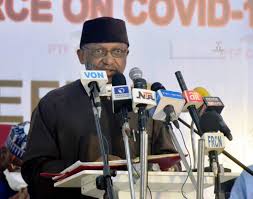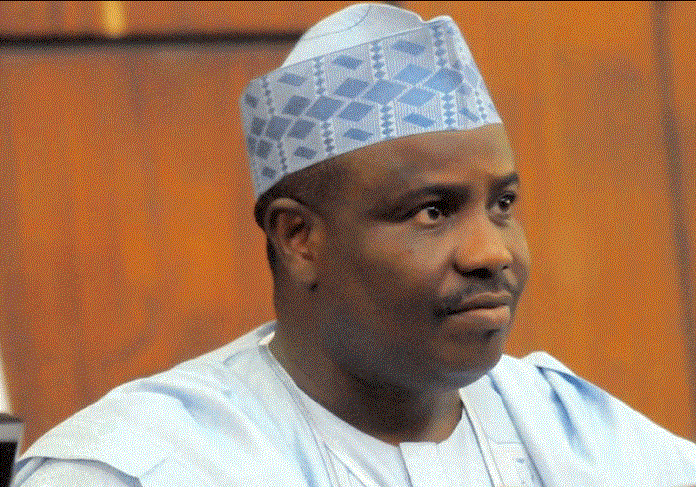The federal government yesterday linked the death of about 587 out of the 979 people who died under controversial circumstances in Kano State in April to COVID-19. The figure represents 60 per cent of the fatality data.
The Minister of Health, Dr. Osagie Ehanire, gave the data during the briefing by the Presidential Task Force on COVID-19 in Abuja hours before the Nigeria Centre for Disease Control (NCDC) gave its daily update on the battle against COVID-19, saying Nigeria has recorded 315 new cases, bringing to 12,801 the number of confirmed cases in the country with 4,040 persons discharged, while 361 persons have died.
In a breakdown of the new cases, NCDC said Lagos recorded 128 new cases, the Federal Capital Territory (FCT) 34, Rivers 32, Edo 28, Oyo 22, Kaduna 20, Gombe 13, Ogun eight, Kwara and Delta seven each, Plateau and Kano five each, Bauchi four, and Katsina two.
It said: “Nigeria has recorded 12,801 cases of COVID-19. 4,040 persons have been discharged while 361 persons have died.”
A preliminary research, however, has shown that 70 per cent of persons infected with the virus do not pass it on to others.
Speaking yesterday on the report of the federal government’s fact-finding team sent to Kano State to investigate the strange deaths in the state, the Minister of Health, Dr. Osagie Ehanire, told journalists during the briefing by the Presidential Task Force on COVID-19 in Abuja that the final report showed that a total of 979 deaths were recorded in eight municipal councils in the state at the rate of 43 deaths per day.
He said: “With regard to unexplained deaths in Kano, which occurred in April, the team confirmed from graveyard records that a total of 979 deaths were recorded in eight municipal local governments areas of the state at a rate of 43 deaths per day, with a peak in the second week of April. By the beginning of May, the death rate had reduced to 11 deaths per day it used to be.”
He explained that the verbal autopsy carried out showed that about 56 per cent of the deaths had occurred at home, while 38 per cent were in the hospital.
“With circumstantial evidence as all to go by, investigation suggests that between 50-60 per cent of the deaths may have been triggered by or due to COVID-19, in the face of pre-existing ailments. Most fatalities were over 65 years of age,” he said.
Ehanire added that over 150 health workers have been infected at the time of the arrival of the medical team.
He, however, said there was no report of an infection among health workers who had received training from the team on infection prevention and control.
“It is gratifying to note that they all returned safely and had no incident of contracting the infection,” he stated.
The minister also spoke on the milestones reached within 100 days of COVID-19 pandemic in the country, saying over 76,800 persons have been tested.
The minister said since the country began more aggressive tracking and testing, it had increased its laboratory network capacity from five to 30 molecular laboratories, with a plan for at least one laboratory in every state.
On plans to develop health policy guidelines for the aged, the minister said two webinar meetings were held on June 3 and 4 on the effect of COVID-19 on health and care management of the elderly.
He said the meeting was conducted in collaboration with the West African Health Organisation (WAHO), and it took a critical look at various aspects of the impact of the disease on the elderly, who are usually at higher risk of infection.
“The outcome of the webinar provides grounds for policy direction for care of the elderly during and beyond COVID-19. The general recommendation is that senior citizens are vulnerable and should stay at home most times and wear a mask once outside their home,” he stated.
70% of Infected Persons Can’t Infect Others, Says Report
A preliminary research has shown that 70 per cent of persons infected with COVID-19 do not pass the virus on to others.
The study also showed that most 20 per cent of infected persons are the super-spreaders of the high incidence of the virus seen across the world.
The study conducted by a group of epidemiologists in Hong Kong found that just 20 per cent of cases studied were responsible for 80 per cent of all COVID-19 transmissions, noting that all super-spreading events involved indoor social gatherings.
The epidemiologists examined more than 1,000 COVID-19 cases in Hong Kong between January 23 and April 28, and they found out that super-spreading was the primary means of transmission in the city.
‘The term ‘super-spreader’ refers to an infected person who transmits the virus to more people than a typical infected person would.
The research noted that about 350 of the cases analysed were a result of community spread, while the rest were imported from other countries, adding that within the community-spread cases, more than half were connected to six super-spreading events.
“An average person with the coronavirus infects about two other people, but an infected person sometimes passes the virus to far more people during a super-spreader event. An estimated 70 per cent of infected patients studied didn’t pass the virus at all.
“By targeting locations and activities that beget super-spreading, countries may be able to avoid more lockdowns during future waves of infections. Super-spreader events, in which one person infects a disproportionately large number of others, are the primary means by which the coronavirus spreads, new research suggests,” the report said.
Doctors to Begin Nationwide Strike June 15
Despite the threat posed by COVID-19 in Nigeria, the National Association of Resident Doctors (NARD) has said it would commence a nationwide strike on June 15 to press home its demands.
In a statement yesterday and made available to THISDAY, NARD National President, Dr. Aliyu Sokomba, said the federal government’s unwillingness to address its concerns has resulted in the association’s decision to commence the indefinite industrial action.
He said: “Consequent upon the 14-day ultimatum duly served the federal government for an indefinite strike, in accordance with the resolution of the ordinary general meeting of the association on May 29, 2020, we hereby notify you that all resident doctors, medical officers below the rank of Principal Medical Officer (PMO) and house officers across all the federal and state hospitals in Nigeria, shall be embarking on a total and indefinite strike effective 12:01 a.m on Monday, 15 June 2020.
“It is important that you make alternative arrangements for the care of the patients as the strike shall be total and indefinite. No service of any kind, be it emergency, care at COVID-19 isolation and treatment centres shall be exempted. We sympathise with the patients and Nigerian populace.”
He listed the union’s demands to include the provision of Personal Protective Equipment (PPEs) for all healthcare workers, immediate reversal of the illegal disengagement of all 26 resident doctors in Jos University Teaching Hospital and the payment of all salaries owed them.
FG to Pay N20bn Hazard Allowance to Health Workers
However, as part of efforts to appease the health workers, the federal government has undertaken to pay over N20 billion as three months’ hazard allowance for those in the frontline battling to contain the pandemic.
At a meeting yesterday in Abuja, the federal government said the hazard allowance for April and May would be paid before Friday, while that of June would be paid by the end of the month.
This was part of the agreement reached between the government representatives led by the Minister of Labour and Employment, Senator Chris Ngige, and the representatives of the health sector workers.
The Nigerian Medical Association (NMA), NARD, the Joint Health Sector Unions and affiliates of JOHESU, the Nigerian Midwives Association are among unions whose members are to benefit from the package.
Speaking after the meeting, Ngige said the urgent approval given by President Muhammadu Buhari was in appreciation of the efforts of the health workers, risking their lives on the frontline in the fight against COVID-19.
He said the government had approved insurance coverage for the workers, adding that the gesture was in consonance with the Memorandum of Understanding (MoU) entered on April 21 between the federal government and the representatives of the health workers’ unions on the COVID-19 Special Incentives for the public sector health workers under the federal civil service.
He said: “We reviewed all and also, we reviewed the emoluments that we are to give these gallant workers who are in the frontline taking the risk for all of us and the federal government side has given them the financial implications of what they have done.
“So, we have fixed a timeline for ourselves that before the end of this week, the health workers captured in that particular COVID-19 net; frontline workers should get all their hazard and inducement allowances for the months of April and May before the close of the week.”
According to him, the decision on the commencement of the implementation of the allowances was reached along with the Accountant-General of the Federation and Minister of Health.
In his remarks, the Minister of State for Health, Senator Olorunninbe Mamora, said the ministry would ensure the provision of PPEs to various hospitals.
NMA General Secretary, Dr. Ekpe Philip Uche, said they were pleased with the outcome of the negotiations.
IG Unveils New Operational Guidelines for Police
Inspector-General of Police, Mohammed Adamu, yesterday unveiled new operational guidelines for the police and other law enforcement agencies on COVID-19 prevention enforcement duties.
The guidelines are also expected to deal with emerging incidents of gender-based violence.
The IG said in Abuja that the guidelines were necessitated by the increase in reported cases of domestic violence, rape, defilement, cybercrimes, among others linked with the COVID-19 restrictions.
“These unfortunate incidents have prompted the introduction of these operational guidelines, which will help to adequately coordinate and reshape the conduct of personnel of the force and other law enforcement agencies on the frontline of operations in the enforcement of the COVID-19 prevention orders.
“It will also serve as a standard code of conduct for police officers in similar operations in the future,” he said.
The IG directed the Assistant Inspectors-General of Police and Commissioners of Police in zonal and state commands as well as heads of police departments and formations to make the guidelines subject of departmental briefings and lectures.
He said the operational guidelines would also serve as a training manual in all police training institutions.
“Consequently, the IG has also ordered the strengthening of the Gender-Desk Units and the Juvenile Welfare Centres (JWCs) across the country and the deployment of investigative assets to deal with gender-related offences.
“In addition, the cybercrime unit of the force has also been strengthened to deal with cybercrimes connected with the COVID-19 pandemic,” he added.
Lagos Allays Fears of Virulent Virus
Lagos State Commissioner for Health, Prof. Akin Abayomi, yesterday dismissed fears over claims that the state now has a virulent strain of the virus.
Abayomi, in a message seen yesterday by THISDAY, said: “No evidence for virus becoming more virulent strain. We are still on the up slope of the outbreak. In other words, we have not yet peaked.”
Earlier, THISDAY had learnt that the state had entered into a second phase of the pandemic, with the strain of the virus considered more virulent.
“The pandemic seems to have entered a second phase in Lagos with elevated levels of new infections. The current strain also seems to be more virulent. Please don’t let your guard down, it’s been a long haul but we must reach the finishing line,” a source had said.
FG Issues Protocols for Evacuation of Nigerians Abroad
Also speaking during the briefing, the Chairman of the Presidential Task Force on COVID-19, Mr. Boss Mustapha, stated that nearly 80,000 tests carried out so far were among the accomplishments of the task force in 100 days since the country’s index case was recorded on February, 27, 2020.
He also said over 13,000 health workers were trained, increasing the human resource available for case management, more personal protective equipment and ventilators procured and prepositioned across the country, while the number of beds available for isolation and case management had increased from 3,000 to 5,000 nationwide.
He added that in the last 100 days, PTF developed new guidelines for homecare and general case management; evacuated over 1,000 Nigerians from different parts of the world, while still reviewing the evacuation and quarantine protocols; enhanced the efficiency of the identification, testing, evacuation, and isolation process for confirmed cases and gradually reopened the economy, while balancing between lives and livelihood.
Others achievements included the conduct of Mid Action Review in line with WHO guidelines, with lessons and recommendations being used to improve the response, engagement with development partners and the private sector to grow the capacity of the nation in the response and introduction of several non-pharmaceutical interventions to slow down the spread of the virus.
He said there were several ongoing infrastructure interventions government was making in collaboration with development partners and the private sector nationwide.
He added that PTF has commenced the process of integrating comprehensive psychological services programme into its activities for the benefit of people who are in isolation and the wellbeing of their families and communities.
”As we mark the 100 days after the index case, we remember all Nigerians who have passed away from the disease. We commiserate with their families and friends who have had to deal with the difficulty of losing their loved ones at this time. We pray that God will continue to console them and heal our land,” he stated.
FG Issues Protocols on Evacuation of Nigerians Abroad
The PTF has also issued the protocol on the safe evacuation of Nigerian citizens who are living abroad and have indicated willingness to return to the country.
The protocols would be applied when the federal government resumes the evacuation of Nigerians, which is presently suspended.
PTF National Coordinator, Dr. Sani Aliyu, who read out the protocols yesterday, said the task force, which is working with the private sector, was banking on making the arrangement successful to allow the more than 4,000 returnees come in and enjoy their families.
According to him, the protocols are a joint effort by some of the federal government agencies including the Ministry of Health, NCDC, the Nigeria Diaspora Commission and the aviation sector.
Key aspect of the aspects of the protocol is that Nigerians outside the country would undergo the PCR for COVID-19.
The least time for the test is 14 days and prior to boarding they would sign an undertaking that they would follow the necessary precautions applied by PTF when they arrive the country.
Aliyu added that there would be a repeat PCR test when they arrive in the country, adding that within 72 hours, they would be given appointment card and a place where they would go and do the test.
According to him, the tests would be done in Abuja and Lagos.
He said the returnees would be required to make their accommodation arrangements for 14 days.
Though they would have been tested before boarding the flight, which must be negative, they would be tested again upon arrival within 72 hours of landing to be sure they have not developed COVID-19.
They would supervised and monitored on regular basis everyday for the presence of symptoms that might require them to be taken into treatment if their result is positive.
”These changes will be in line with international practices and the country will be doing a lot more than other countries are doing at the moment. It is important that we get this process to work because we have more than 4,000 Nigerians outside the country.
“We need to smoothen it and make sure we bring home at least 1,000 Nigerians per week so that we clear the backlog over the next four weeks,” Aliyu said, adding all the affected Nigerians are expected to register with the Nigerian missions in their countries of abode.
On his part, the Minister of State for Education, Mr. Chukwuemeka Nwajiuba, said the federal government would only open all schools when it was safe to do so.
He explained that he would not want to experiment with the children by sending them to schools when the protocols for safety have not yet been ratified.
The minister added that he had a meeting with the WAEC, NECO and NAPTEP yesterday on resumption, adding that they are looking at a time after the interstate ban is lifted as they would need the openness associated with the easing of the boundaries for the students to move.
He said the federal government had looked at the letter from WAEC in Ghana, WAEC in the Gambia which reopened schools yesterday.
He said the two examination bodies were participants on the WAEC platforms where the issue of timetable and subjects to be offered were discussed.
UK Evacuates 17,000 Britons from Africa
The United Kingdom has evacuated over 17,000 of its citizens in Nigeria and other African countries as a result of the COVID-19 pandemic.
This was confirmed by the UK Consulate, which indicated that about 2,200 Britons were evacuated from Nigeria.
A statement from its website said charter flights to evacuate Britons from countries in Africa had flown over 150,000 miles, bringing people back from across six different time zones and enabling over 8,400 stranded travellers to return in addition to over 9,000.
This, the statement said, was facilitated by the Foreign Office, which helped the Britons to return on commercial flights.









